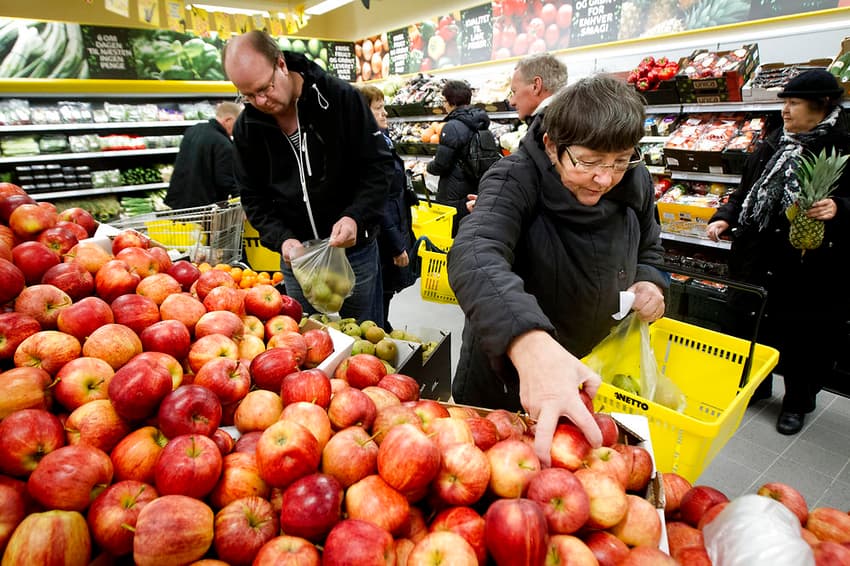Denmark’s Social Democrats want to stop supermarkets from wasting food

Over 715,000 tonnes of food are wasted annually in Denmark, with nearly a quarter of that figure coming from retailers. That is too much, say the Social Democrats, who are prepared to legislate against wastage.
The Social Democrats could pass laws restricting supermarkets from throwing out food should they win next week’s general election, Ritzau reports.
The party on Wednesday presented a new plan to reduce food waste.
Should it be elected as leader of a new government in next week’s general election, the Social Democrats will enter dialogue with the food retail sector to find a target for reduction of wastage, which the industry will then be required to comply with.
If targets are not met, a Social Democrat-led government would seek to pass laws banning food waste, said Dan Jørgensen, the party’s deputy leader in parliament.
“In the first instance, we would hope that when we reach an agreement with the retail industry, they will reach that (target),” Jørgensen said.
“But if there are no results, we are prepared to legislate,” he added.
Potential laws in the area could require companies to use unsold food as biofuels, animal feed or for donation to charitable organisations, with the overall aim of preventing it from being thrown out, Jørgensen explained.
The party has so far resisted setting out any specific criteria or sanctions for companies that do not meet agreed targets.
But a number of initiatives would be put into place to reduce food waste with the targets in mind, deputy leader Jørgensen said.
Current VAT (Danish: moms) rules can result in extra expenses for stores which donate or give away food, and could be subject to change as part of the Social Democrat initiative.
But the industry has previously pointed out that EU rules make legislative changes in the area difficult.
Charities which make use of surplus food could also be boosted by the party’s plan, but no specific spending has yet been set out.
“It could well be that this area needs more resources, and we will look at that,” Jørgensen said.
A number of Danish companies already have schemes in place to reduce food waste.
These include Salling Group, which owns the Netto and Føtex chains amongst others in Denmark. The company aims to halve its food wastage by 2030.
Private households remain the biggest source of food waste in Denmark, with a 36 percent share – equivalent to 260,000 tonnes annually. Retail is the second largest contributor, at 23 percent or 163,000 tonnes.
READ ALSO:
Comments
See Also
The Social Democrats could pass laws restricting supermarkets from throwing out food should they win next week’s general election, Ritzau reports.
The party on Wednesday presented a new plan to reduce food waste.
Should it be elected as leader of a new government in next week’s general election, the Social Democrats will enter dialogue with the food retail sector to find a target for reduction of wastage, which the industry will then be required to comply with.
If targets are not met, a Social Democrat-led government would seek to pass laws banning food waste, said Dan Jørgensen, the party’s deputy leader in parliament.
“In the first instance, we would hope that when we reach an agreement with the retail industry, they will reach that (target),” Jørgensen said.
“But if there are no results, we are prepared to legislate,” he added.
Potential laws in the area could require companies to use unsold food as biofuels, animal feed or for donation to charitable organisations, with the overall aim of preventing it from being thrown out, Jørgensen explained.
The party has so far resisted setting out any specific criteria or sanctions for companies that do not meet agreed targets.
But a number of initiatives would be put into place to reduce food waste with the targets in mind, deputy leader Jørgensen said.
Current VAT (Danish: moms) rules can result in extra expenses for stores which donate or give away food, and could be subject to change as part of the Social Democrat initiative.
But the industry has previously pointed out that EU rules make legislative changes in the area difficult.
Charities which make use of surplus food could also be boosted by the party’s plan, but no specific spending has yet been set out.
“It could well be that this area needs more resources, and we will look at that,” Jørgensen said.
A number of Danish companies already have schemes in place to reduce food waste.
These include Salling Group, which owns the Netto and Føtex chains amongst others in Denmark. The company aims to halve its food wastage by 2030.
Private households remain the biggest source of food waste in Denmark, with a 36 percent share – equivalent to 260,000 tonnes annually. Retail is the second largest contributor, at 23 percent or 163,000 tonnes.
READ ALSO:
Join the conversation in our comments section below. Share your own views and experience and if you have a question or suggestion for our journalists then email us at [email protected].
Please keep comments civil, constructive and on topic – and make sure to read our terms of use before getting involved.
Please log in here to leave a comment.